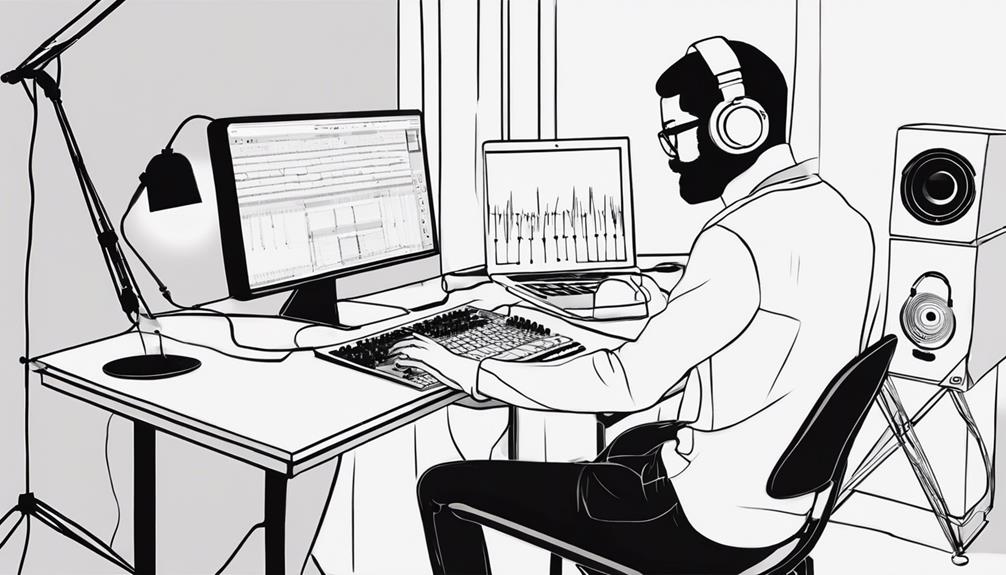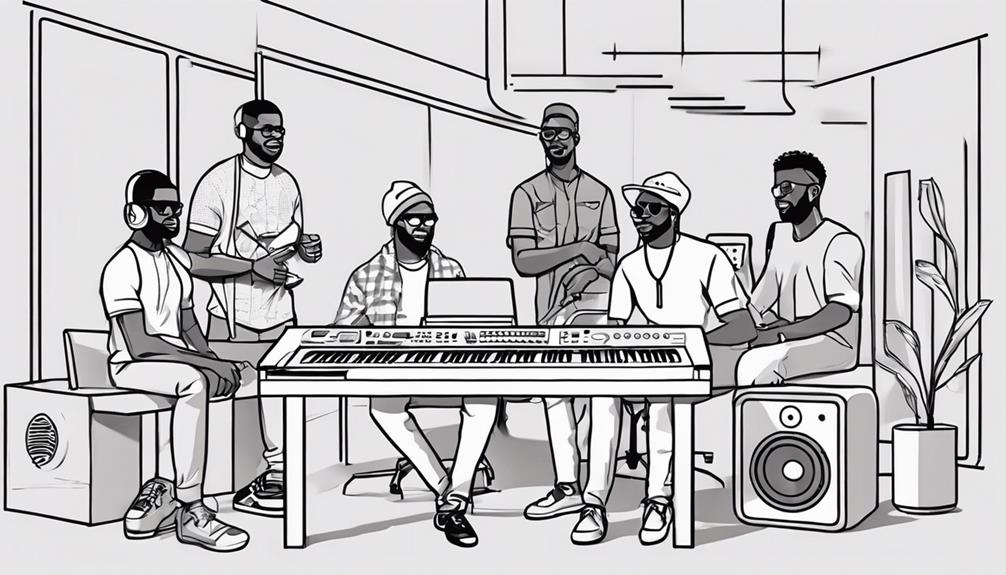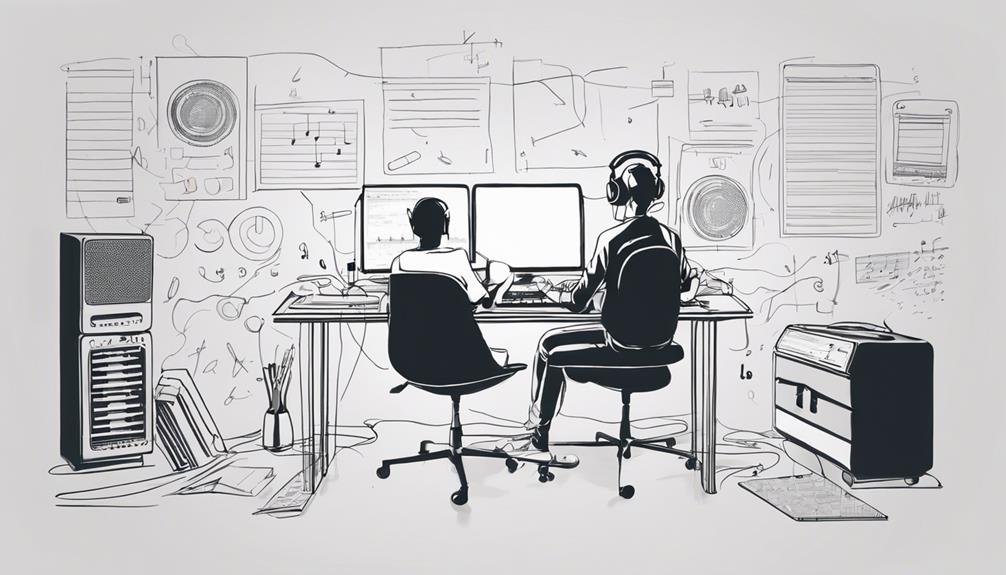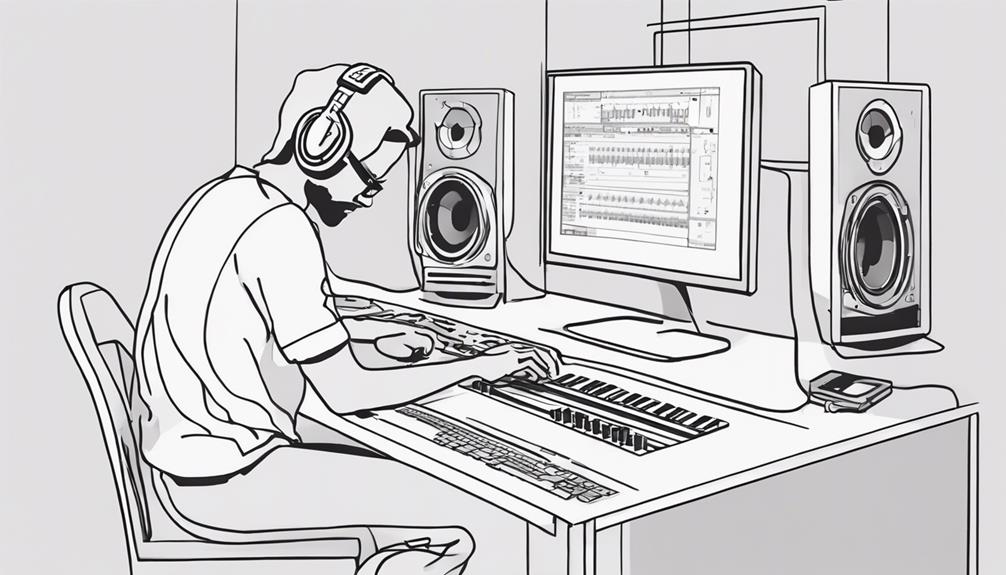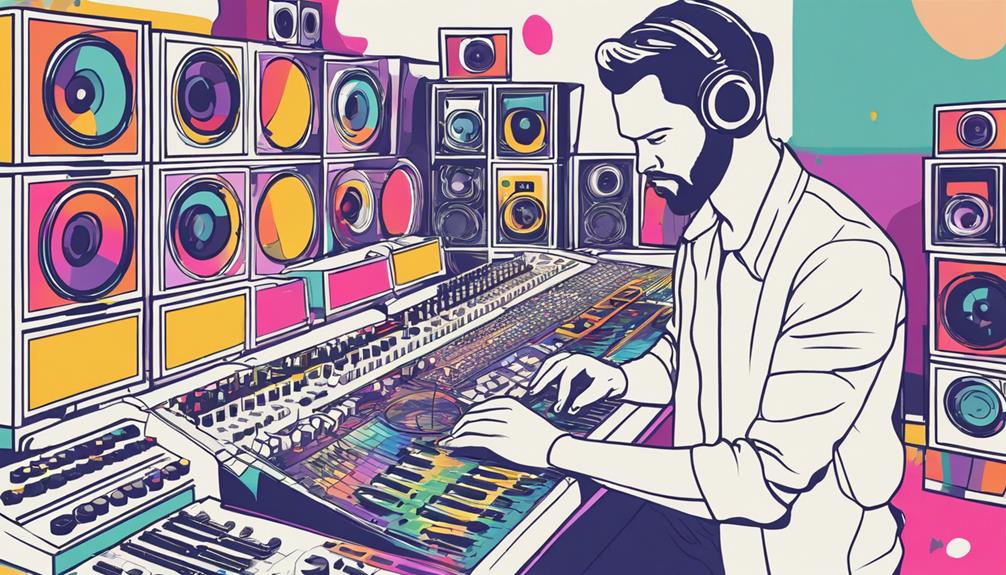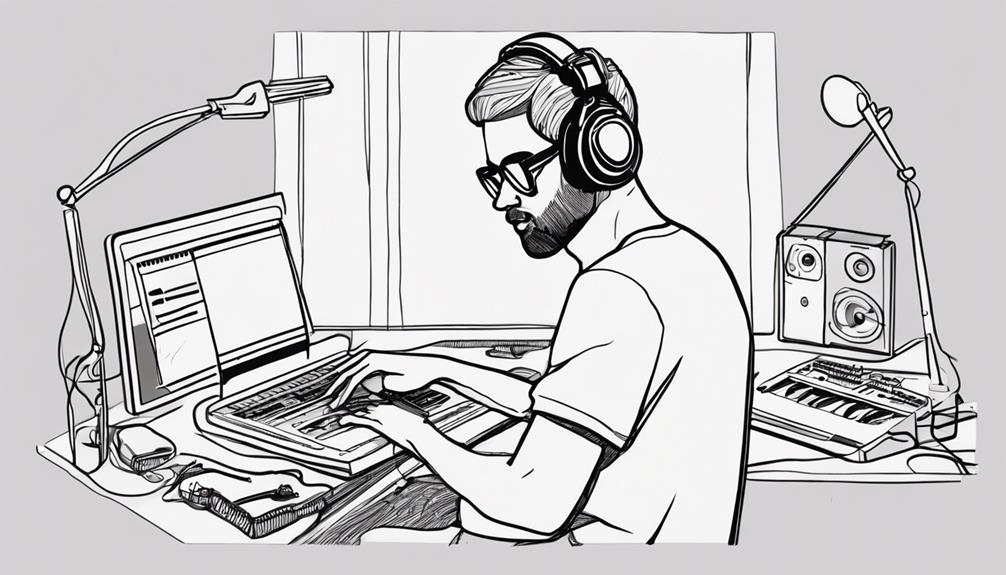To kickstart your music production journey, start by exploring software like Ableton Live or Logic Pro. Download free trials to practice recording and editing. Learn the basics of using tools like the audio interface. Grasp key music theory concepts, including chord progressions, to craft harmonious melodies. Practice regularly to refine your skills. Want to uncover advanced techniques and insider tips? Discover more ways to elevate your music by delving deeper into mastering software, perfecting chord progressions, and honing production skills.
Key Takeaways
- Explore music software like Ableton Live or Logic Pro.
- Master music theory basics like key signatures and chord progressions.
- Practice techniques in music production software regularly.
- Network within the music industry for collaboration and opportunities.
- Experiment with sounds, samples, and essential equipment for production.
Getting Started With Music Software
To begin your music production journey, start by exploring popular music software programs such as Ableton Live, Logic Pro, FL Studio, and Pro Tools. These software options offer a wide range of features and tools to help you create and edit music effectively. Once you have chosen a software program, download a free trial version to get hands-on experience with its interface and functionalities.
When starting out, focus on learning the basics of the software, including how to navigate the interface, record audio, and edit music tracks. Familiarize yourself with essential tools like the audio interface for connecting your instruments and microphones to the software. Experiment with different features within the software, such as the robust editing capabilities in Pro Tools or the intuitive interface of FL Studio.
Regular practice using the music software is key to improving your skills and becoming comfortable with its functionalities. Take the time to explore and understand the various tools available to you, as this will lay a solid foundation for your music production journey.
Mastering Music Theory Basics
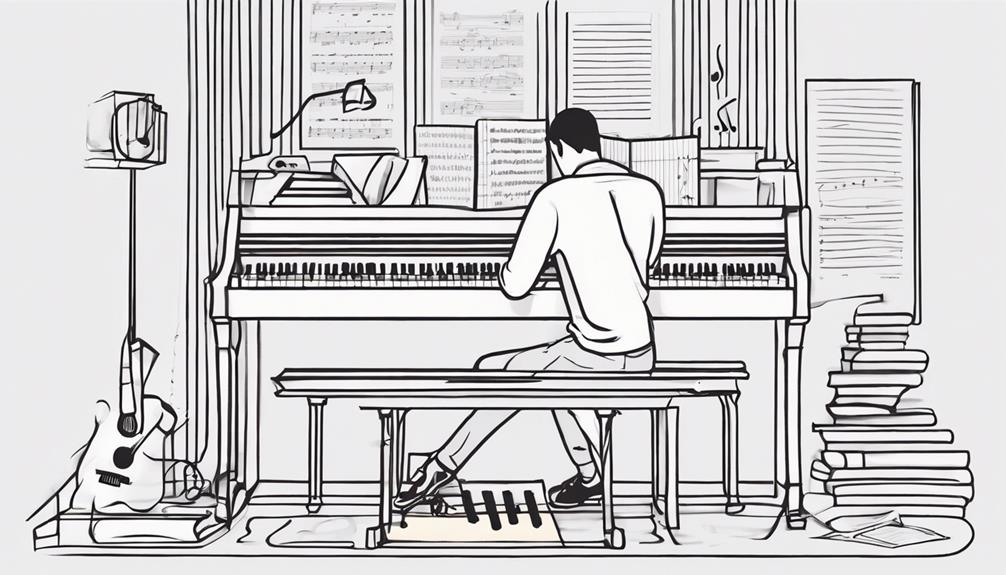
Now, let's tackle the essential elements of music theory that will elevate your productions.
Mastering key signatures will guide you in understanding the tonal center of a piece.
Grasping chord progressions is essential for crafting engaging melodies.
These fundamental concepts will lay a solid groundwork for your musical journey.
Key Signature Fundamentals
Mastering the basics of music theory involves understanding the fundamentals of key signatures, which play an essential role in determining the tonal center and harmonious structure of a musical composition.
Key signatures serve as a roadmap for musicians, indicating which notes are sharp or flat within a specific key. By grasping key signatures, you gain insight into the mood and sound of a piece, enabling you to craft harmonically pleasing melodies.
These signatures, represented by sharps or flats at the start of a staff, impact all corresponding notes throughout the composition. Understanding key signatures is vital for creating cohesive and musically satisfying pieces across different genres.
With expertise in key signatures, you'll have a solid foundation to build upon, enhancing your ability to compose melodies and chord progressions that resonate with listeners. Immerse yourself in key signature fundamentals to harness the potential of your musical creations.
Chord Progression Essentials
Explore the fundamental concept of chord progressions as essential elements that create harmony and movement within music compositions.
Chord progressions are sequences of chords that form the backbone of a piece, guiding its emotional direction.
Understanding common progressions like the I-IV-V, ii-V-I, and vi-IV-I can help you investigate various music genres with confidence.
Investigate different chord qualities such as major, minor, diminished, and augmented chords to evoke diverse emotional tones in your music.
By studying music theory principles like diatonic harmony, you can grasp how chords within a key interact harmoniously, leading to cohesive and pleasing compositions.
To master chord progressions, practice creating your own using online resources, music theory books, and experimenting with different chord combinations.
Embrace the power of chord progressions in shaping the mood and structure of your music, and watch as your compositions come to life with depth and richness.
Practicing Techniques and Skills
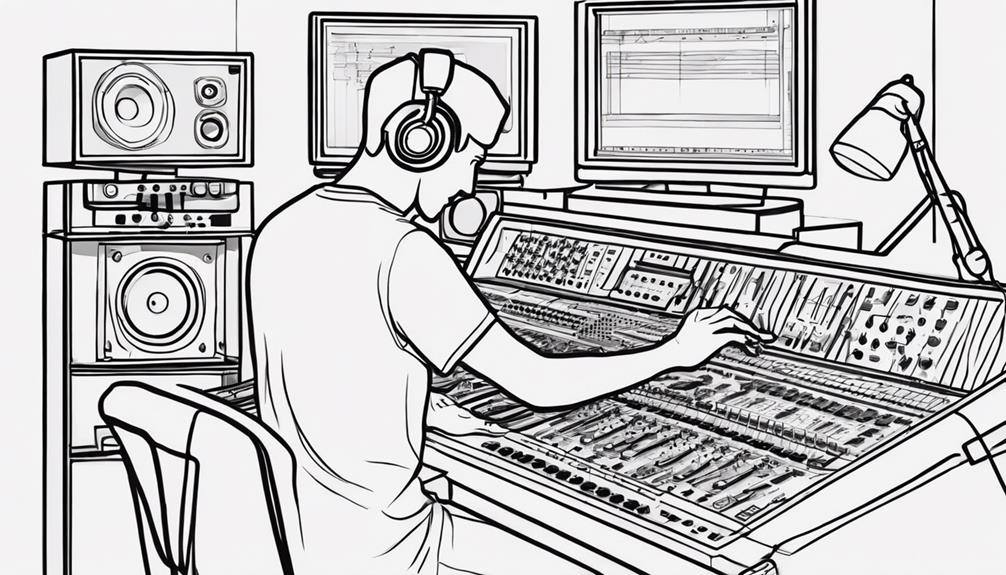
Practice is key in honing your music production skills. Experiment with various sound design techniques, refine your mixing and mastering abilities, and familiarize yourself with MIDI controllers.
Key Practicing Methods
Regularly engaging in music theory exercises can greatly enhance your understanding of scales, chords, and rhythm. To further develop your music production skills, experiment with different sounds and techniques in your music production software. Dedicate daily time to practice creating beats and melodies, starting with simple compositions and gradually progressing to more complex ones as you become more familiar with the software and music theory concepts. Collaborating with other producers and musicians is also essential. This allows you to learn new techniques, gain experience in the music industry, and receive valuable feedback on your work.
| Key Practicing Methods | Benefits |
|---|---|
| Practice music theory exercises | Enhances understanding of scales, chords, and rhythm |
| Experiment with music production software | Improves skills in sound manipulation and production techniques |
| Collaborate with musicians | Learn new techniques and gain industry experience |
Developing Production Skills
Enhance your music productions by exploring various effects and plugins to create unique textures and improve sound quality. To develop your production skills effectively, try the following techniques:
- Engage: Engage in sound design by adjusting synthesizers and manipulating audio samples to craft your own signature sounds that set your music apart.
- Immerse: Immerse yourself in balancing the levels of different tracks, applying EQ and compression to achieve a cohesive and balanced mix that allows each element to shine.
- Master: Focus on the final touches by mastering your tracks, ensuring they're loud, clear, and ready for distribution across various platforms.
- Reference Tracks: Use reference tracks from established artists to analyze their techniques in sound design, mixing, and mastering, helping you learn new approaches and refine your skills.
Effective Learning Strategies
To effectively develop your music production skills, it's essential to consistently experiment with various sounds, instruments, and effects to foster creativity and growth.
When learning music production, adopting a structured approach is key. Start by mastering basic skills such as sound design, arrangement, and mixing before delving into more complex techniques.
Practice regularly to refine your abilities and develop a unique style in music creation. Experiment with different genres and collaborate with fellow producers and musicians to gain new perspectives and insights.
Setting specific goals for each practice session will help you track your progress and identify areas for improvement.
Networking Within the Music Industry
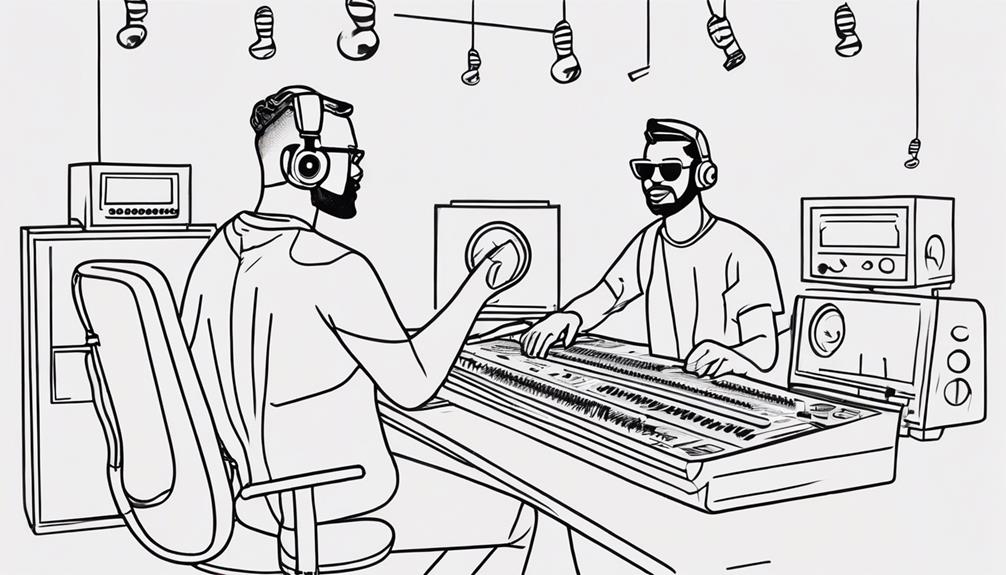
Engage actively in networking opportunities within the music industry to expand your connections and grow your career prospects. By participating in various events and online platforms, you can establish valuable relationships that may lead to exciting opportunities.
Here's how you can effectively network within the music industry:
- Attend Music Industry Events: Make the most of workshops, conferences, and networking mixers to meet professionals and enthusiasts who share your passion.
- Join Online Music Production Communities: Connect with like-minded individuals, seek potential collaborators, and stay updated on industry trends through online forums.
- Utilize Social Media Platforms: Showcase your work on platforms like LinkedIn, Instagram, and Twitter to attract industry professionals and engage with a broader audience.
- Attend Music Festivals and Concerts: Take advantage of these gatherings to network with artists, producers, and key players in the music industry.
Networking is an essential aspect of building a successful career in music production, so be proactive in seeking out opportunities to connect with others in the field.
Starting Simple Music Projects
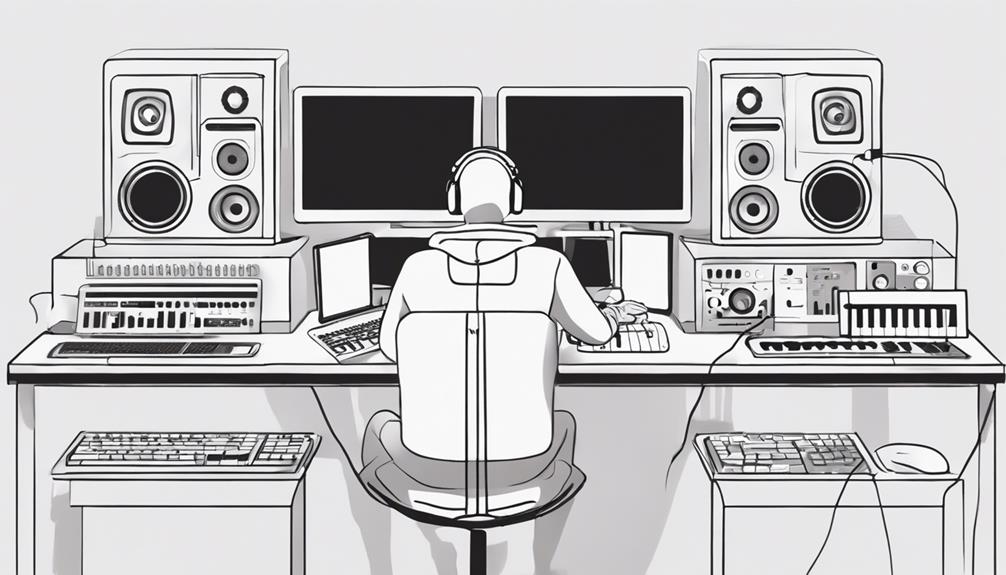
Begin your journey in music production by creating simple beats or melodies using your music production software. Start with basic elements like drum loops, chord progressions, or basslines to build your projects. As you explore making music, remember to experiment with different sounds, effects, and virtual instruments to enhance your compositions. It's important to focus on mastering fundamental techniques before advancing to more complex projects. Below is a table that outlines the progression from beginner to advanced music producers regarding the complexity of their music projects:
| Music Producer Level | Description |
|---|---|
| Beginner | Simple beats and melodies |
| Intermediate | Layering sounds and effects |
| Advanced | Complex arrangements and mixing techniques |
Experimenting With Sounds and Samples
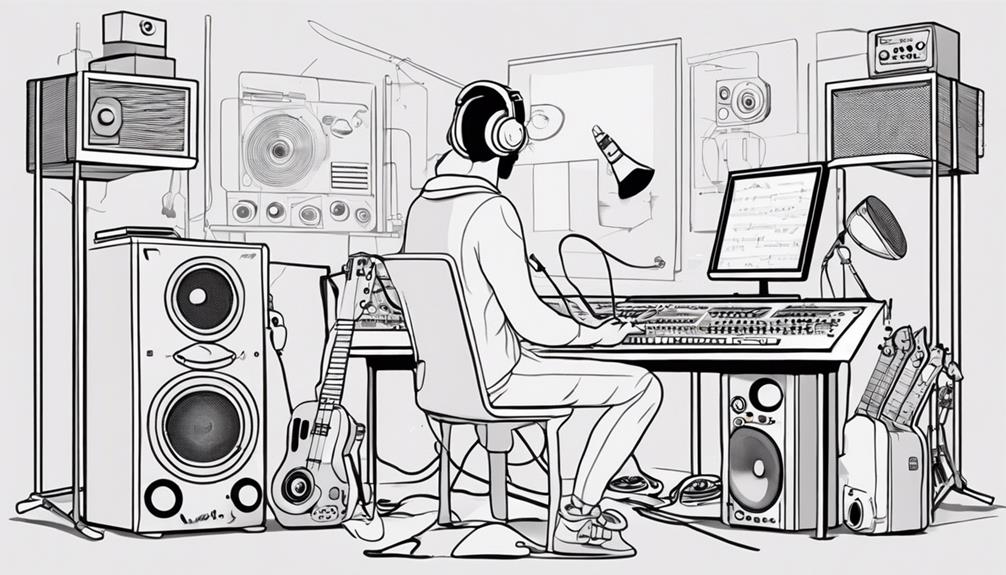
Explore a world of sonic possibilities by experimenting with sounds and samples in your music production projects. By delving into different techniques and tools, you can elevate your tracks to new heights.
Here's how you can make the most of experimenting with sounds and samples:
- Diversify Your Sound Palette: Experiment with various instruments, synthesizers, and drum kits to create unique sounds that set your music apart.
- Utilize Sample Libraries: Incorporate sample libraries and virtual instruments to add depth and texture to your tracks, enhancing the overall sonic experience.
- Layering for Depth: Layer different sounds together to create rich and dynamic compositions that engage your listeners on multiple levels.
- Effect Manipulation: Enhance the impact of your samples by manipulating them with effects like reverb, delay, and distortion, giving them a unique edge in your music.
Essential Equipment for Music Production
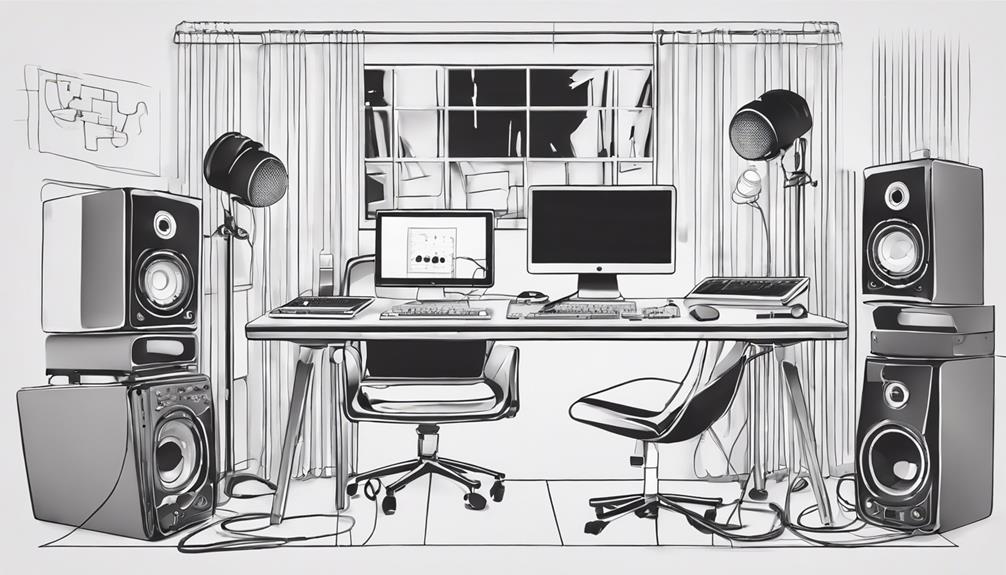
To produce music effectively, you need essential equipment such as a computer or laptop, digital audio workstation (DAW) software, an audio interface, studio monitors, and quality microphones. A good DAW software like Ableton Live, Logic Pro, or FL Studio is essential for composing, recording, arranging, editing, and mixing music. An audio interface connects your instruments and microphones to the computer, ensuring high-quality input and output of audio signals. Studio monitors are specialized speakers designed for accurate sound reproduction, vital for mixing and mastering music. Quality microphones are key for capturing vocals, instruments, and other sound sources with clarity and fidelity in music production.
| Essential Equipment | Description | Example |
|---|---|---|
| Audio Interface | Connects instruments and microphones to the computer for high-quality audio signals | Focusrite Scarlett 2i2 |
| Studio Monitors | Specialized speakers for accurate sound reproduction, crucial for mixing and mastering music | KRK Rokit 5 G4 |
| Digital Audio Workstation (DAW) | Software for composing, recording, editing, and mixing music | Ableton Live, Logic Pro, FL Studio |
Frequently Asked Questions
How to Start Learning Music Production From Scratch?
Start by choosing a music production software. Watch tutorials and use free trials to learn the basics. Understand music theory concepts like scales and chords. Practice creating beats and melodies regularly. Network with producers for experience.
How I Taught Myself Music Production?
You taught yourself music production by downloading software, watching tutorials, practicing beats, collaborating with others, and experimenting with sounds. Your dedication and hands-on approach were key in honing your skills and mastering music production. Over time, you began to develop your unique style, blending different influences and techniques to create something truly your own. Sharing your journey with others gave you the opportunity to inspire aspiring producers, often offering tips on how to learn music production effectively. By staying curious and open to feedback, you continuously improved and pushed the boundaries of your creativity.
Can You Learn Music Production on Your Own?
You can definitely learn music production on your own. The abundance of online resources and communities provides support. Your journey will involve trial and error, setting clear goals, consistent practice, and seeking feedback.
What Is the Best Way to Learn Audio Production?
To learn audio production effectively, immerse yourself in online courses, join forums for insights, attend workshops for hands-on learning, gain experience through internships, and invest in quality equipment. Consistent practice and networking are key.
Conclusion
To sum up, by dedicating time to get started with software, mastering theory basics, practicing techniques, networking in the industry, starting simple projects, and experimenting with sounds, you can become a music production pro!
Remember, the key to success in this field is persistence and passion. So keep pushing yourself to learn and grow, and soon you'll be creating enthralling compositions that mesmerize audiences everywhere.
Happy producing!

